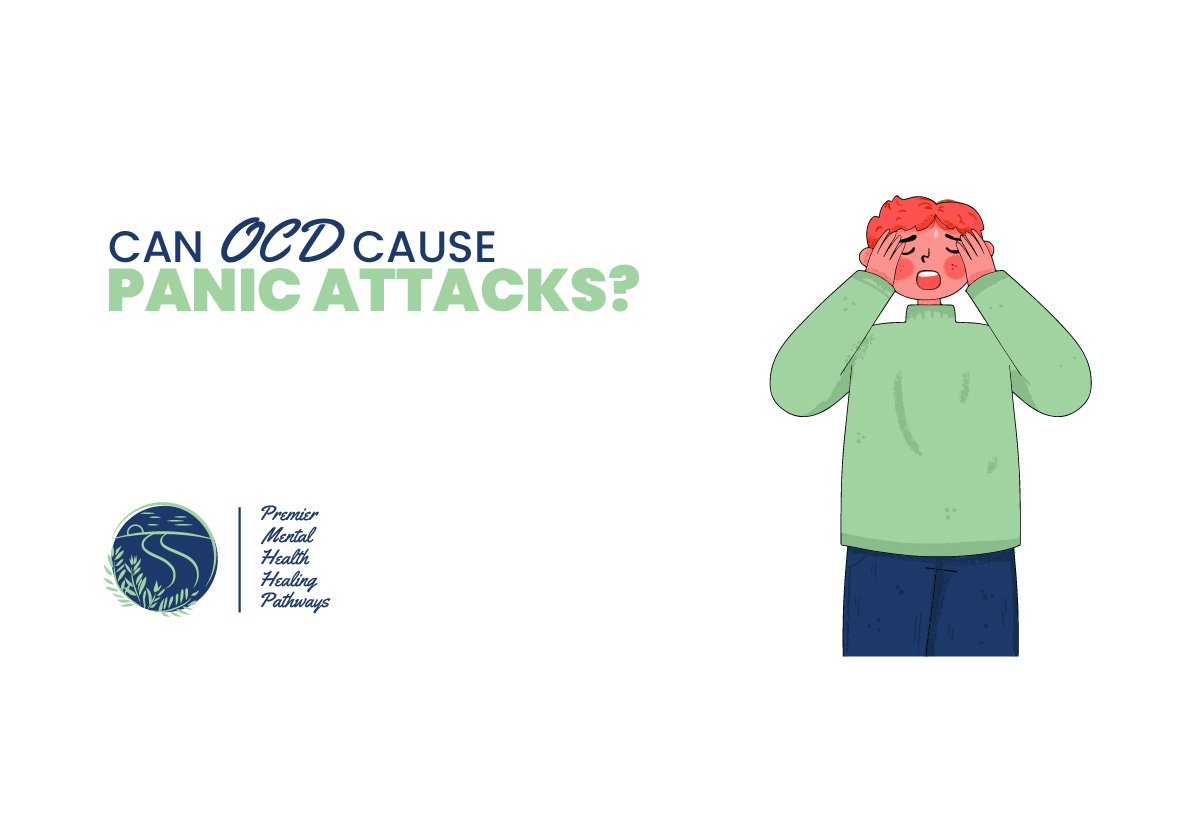Can OCD Cause Panic Attacks?
Living with an Obsessive-Compulsive Disorder (OCD) can be challenging.
OCD means having thoughts that bother you a lot. It also means feeling like you must repeatedly do certain things to make those thoughts disappear.
In some cases, people with OCD also have panic attacks. It’s like their OCD anger attacks and behaviors can suddenly make them feel scared.
At Premier Mental Health, we specialize in treating OCD and panic attacks. Let us help you find practical solutions.
Even though OCD and panic attacks seem different, they often happen together. So, can OCD cause panic attacks? That’s what we’re trying to understand.
What Should You Know about OCD and Panic Attacks?
First, start by exploring the signs of OCD and panic attacks.
Recognizing OCD Panic Attack Symptoms
The signs of an OCD panic attack can vary, but some common ones include:
- Fast Heartbeat: During an OCD panic attack, your heart may beat fast, making you uncomfortable.
- Breathing Difficulty: People with OCD and anxiety attacks may struggle to breathe and feel suffocated or smothered.
- Sweating: Another common sign of an OCD panic attack is excessive sweating. It can vary from slight perspiration to intense sweating across the entire body.
- Shaking or Trembling: You may shake or tremble because you’re scared.
- Chest and Limb Sensations: During an OCD panic attack, chest tightness is common, ranging from mild discomfort to solid pain. Some also feel numbness or tingling in their hands and feet.
- Feeling Dizzy: Feeling dizzy during an OCD and panic attacks is expected. It can feel like you’re a little unsteady, or everything is spinning around you.
- Gastrointestinal Discomfort: Nausea and stomach pain are common during OCD panic attacks, making you feel like you might vomit or have stomach cramps.
- Always Feeling Scared: People with OCD panic attacks often experience constantly feeling scared, even when not having an attack. It makes it hard for them to do daily activities or focus on tasks.
Understanding OCD and Panic Disorder
While OCD and panic disorder are separate conditions, they often coexist.
Studies indicate that up to 4.7% of U.S. adults with OCD also suffer from panic attacks or panic disorder.
This overlap can complicate the diagnosis and treatment of both conditions, as the symptoms can exacerbate each other.
Can OCD Cause Panic Attacks?
An OCD doesn’t directly cause panic attacks. However, their relationship is complex due to anxiety and stress sensitivity.
OCD symptoms can contribute to the development of panic attacks. It is particularly true when obsessions and compulsions cause distress or impairment.
Individuals with OCD may be more prone to anxiety and panic attacks due to heightened stress sensitivity.
The chronic nature of OCD can also lead to ongoing anxiety, which may increase the likelihood of panic attacks occurring.
How to Stop an OCD Attack?
It’s hard to stop an OCD episode once it starts, but you can manage it and make it less severe.
Therapies like CBT and ERP are good at reducing how often and how bad OCD episodes are.
Sometimes, doctors may suggest using anti-anxiety medications to help deal with symptoms.
Also, Acceptance and Commitment Therapy (ACT) can be helpful for OCD and panic attacks. It teaches you to accept uncomfortable thoughts and feelings instead of fighting them.
It also helps you focus on your values and take actions that align with them, even when feeling anxious. It can make it easier to handle OCD and panic attacks.
What Actions are Recommended during an OCD Panic Attack?
If you’re experiencing panic attacks linked to OCD, here are some strategies that may help:
- Practice Deep Breathing: Focus on slow, deep breaths to help calm your nervous system during a panic attack.
- Ground Yourself: Use grounding methods to return to the present. Concentrate on your senses, including the sense of taste. Pay attention to what’s around you to distract your mind from intrusive thoughts.
- Talk to Someone You Trust: Talking to someone you trust during an OCD panic attack can help. Remember, what you’re feeling is regular and temporary. Sharing your feelings can make them feel less overwhelming.
- Take Care of Yourself: Do things that make you feel good and relaxed. Try activities like meditation, spending time outside, or enjoying your hobbies.
- Seek Professional Help: Don’t hesitate to contact a mental health professional for support. They can guide you in managing your OCD and panic attacks.
Ways to Treat OCD Panic Attacks
There are various methods available for treating OCD panic attacks:
- Medication
Selective serotonin reuptake inhibitors (SSRIs) and anti-anxiety medications balance serotonin levels and ease anxiety symptoms.
- Therapy
Cognitive behavioral therapy, including exposure therapy, reduces anxiety, and changing thought patterns can calm OCD.
- Relaxation Techniques
Deep breathing exercises and progressive muscle relaxation help manage stress and anxiety. These practices promote relaxation and can alleviate OCD panic attack symptoms.
Providing feedback aid and Monitoring bodily responses in controlling stress and managing anxiety.
To Conclude
“Can OCD cause panic attacks? OCD doesn’t directly lead to panic attacks, but its anxiety can heighten their chances.
It’s essential to understand this connection to treat both problems effectively.
By dealing with both OCD and panic attacks, people can feel much better. While OCD isn’t the only reason for panic attacks, it can make them worse.
If you’re struggling with panic attacks because of OCD, remember that there’s help out there, and you’re not alone.
If you’re facing challenges with OCD and panic attacks and are in search of treatment, feel free to contact us at Premier Mental Health for an initial consultation.
FAQs
Does OCD cause panic attacks?
An OCD itself doesn’t cause panic attacks, but the anxiety from obsessions or compulsions can trigger them in some cases.
Can OCD and panic attacks be managed?
Yes, individuals can effectively manage both conditions with proper treatment and support.
Can kids have OCD panic attacks?
Yes, kids can have OCD panic attacks too. Talking to a grown-up, you trust is essential if you think you have them.
Are OCD panic attacks dangerous?
OCD panic attacks aren’t physically dangerous, but they can make you feel terrified and make it hard to do things. Getting help can make them easier to deal with.
Do I need special treatment for OCD panic attacks?
Treatment for OCD panic attacks might involve therapy, medications, or making lifestyle changes to help you feel better and manage your feelings.
Can lifestyle changes help?
Healthy habits like exercise, good sleep, and stress management can help manage symptoms.
Are OCD panic attacks permanent?
No, they can be managed with proper treatment and support, and symptoms can improve.






No comment